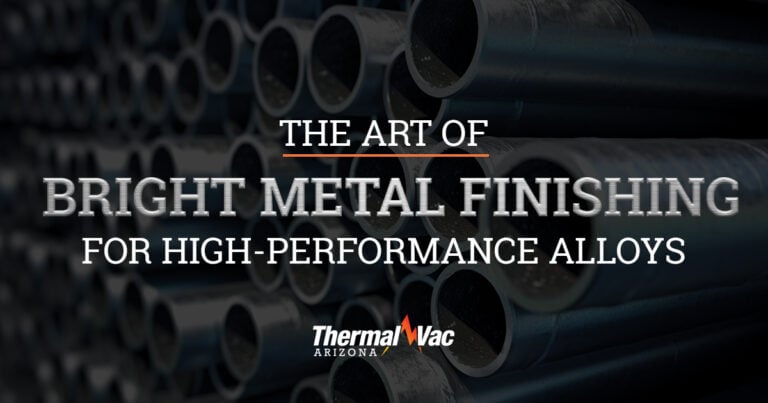Inconel 718 and precipitation-hardening (PH) alloys have proved their mettle across a wide range of industrial sectors, including aerospace, energy, defense, transportation, and medical device manufacturing. These alloys offer a unique blend of robust mechanical properties, high-temperature stability, and corrosion resistance, making them indispensable for applications where reliability and uncompromising performance are critical. The process to transform them from raw alloy to super durable finished components involves a nuanced interweaving of metallurgy, specialized handling, and vacuum heat treatment.
Notable Features of Inconel 718 and PH Alloys
Inconel 718, a nickel-based superalloy, has a significant combination of attributes, including its high strength-to-weight ratio, corrosion resistance, and ability to maintain its chemical properties at elevated temperatures. These characteristics make it ideal for aircraft engine components, rocket motors, and chemical processing equipment.
PH alloys, on the other hand, derive their strength from precipitation hardening, which involves the controlled formation of finely dispersed precipitates within the metal’s microstructure. PH alloys are made from stainless steel and provide exceptional strength, toughness, and resistance to wear and corrosion. They are used in the manufacture of surgical instruments, aircraft components, high-performance automotive parts, and many other applications.
Enhancing Efficiency Through Bright Metal Finishing
Bright metal finishing enhances the corrosion-resistant properties and aesthetic appeal of Inconel 718 and PH alloy components while streamlining process efficiency. Labor-intensive secondary processes like polishing, blasting, and chemical treatments are avoided, resulting in substantial efficiency gains. Given the intricate and delicate nature of Inconel 718 and PH alloys, opting for a direct bright finish through heat treatment not only boosts productivity but also reduces the risk of potential damage to the alloys, ensuring a more efficient and reliable workflow.
Vacuum Heat Treatment: Putting the Pedal to the Metal
Vacuum heat treatment strengthens the durability, aesthetics, and performance features of Inconel 718 and PH alloys. During the treatment, the alloys are heated to temperatures that enable the controlled diffusion of elements within their microstructures to improve their mechanical properties, increasing their hardness and tensile strength.
For Inconel 718, the process involves a sequence of steps that includes solution annealing, quenching, and aging. Solution annealing eliminates previous phase segregation and homogenizes the alloy, while quenching rapidly cools the alloy to maintain its desired properties. Aging is a crucial final step in strengthening the alloy matrix to enhance its overall mechanical durability.
For PH alloys, the process strengthens the alloy to achieve its full hardness, toughness, and corrosion-resistant properties. Vacuum heat treatment eliminates the risk of oxidation during heating to produce a more consistent, predictable outcome.
Challenges Associated with Achieving Optimal Heat Treatment Results
Vacuum heat treating Inconel 718 and PH alloys poses several challenges. The high melting points and low thermal conductivity of the alloys make their machining difficult and can lead to tool wear and tear. Given the intricate specifications of aerospace and other high-performance manufacturers, precision control over heat treatment finishing is critical. Meticulous handling processes must be followed that take into account each alloy’s temperature, time, and cooling rates. Even the slightest deviations can lead to inconsistencies that can impact the finished product’s performance.
Overcoming the Challenges
To overcome the challenges of ensuring Inconel 718 and PH alloys meet their intended specifications, it’s essential manufacturers work with a vacuum heat treatment specialist with engineering expertise to provide the following capabilities:
- Cutting-edge solutions and customer-centricity: To provide solutions that adapt to different kinds of atmospheres and required thermal profiles (e.g., heating speed, treatment time, control of overshoots, etc.).
- Knowledge of precision quenching techniques: To ensure alloys are cooled at controlled rates to prevent distortion and preserve their intricate microstructures.
- Real-time data monitoring capabilities: To ensure temperature, pressure, and other critical parameters are maintained at spec throughout the process and make immediate adjustments when necessary.
- Tailored process optimization procedures: To ensure the finished product is optimized to meet all mechanical, performance, and appearance specifications.
Inconel 718 and PH alloys possess the ideal properties for industrial applications that demand performance excellence under extreme conditions. The synergetic combination of bright metal finishing and vacuum heat treatment adds a layer of resilience to these alloys, which enhances their mechanical properties, corrosion resistance, and overall durability.
As technological advancements evolve and our understanding of material science deepens, Inconel 718 and PH alloys will continue to play an instrumental role in shaping how products are designed and built. Driven by the challenges posed by the unique characteristics of these super durable alloys, manufacturers must strive to harness their potential by adhering to optimized heat treatment protocols and partnering with vendors who sit on the cutting edge of materials and supply chain management.
